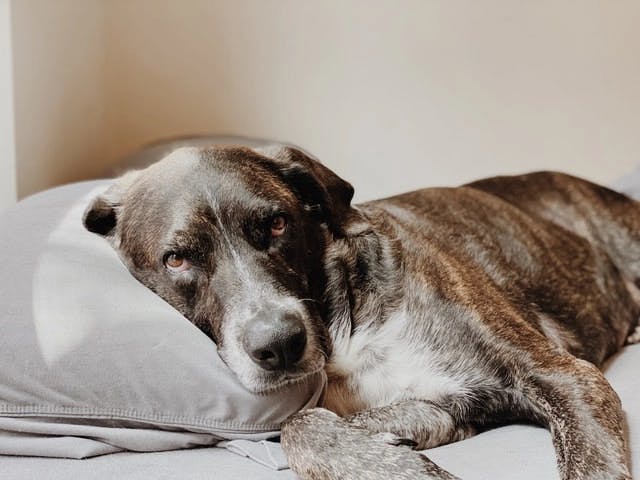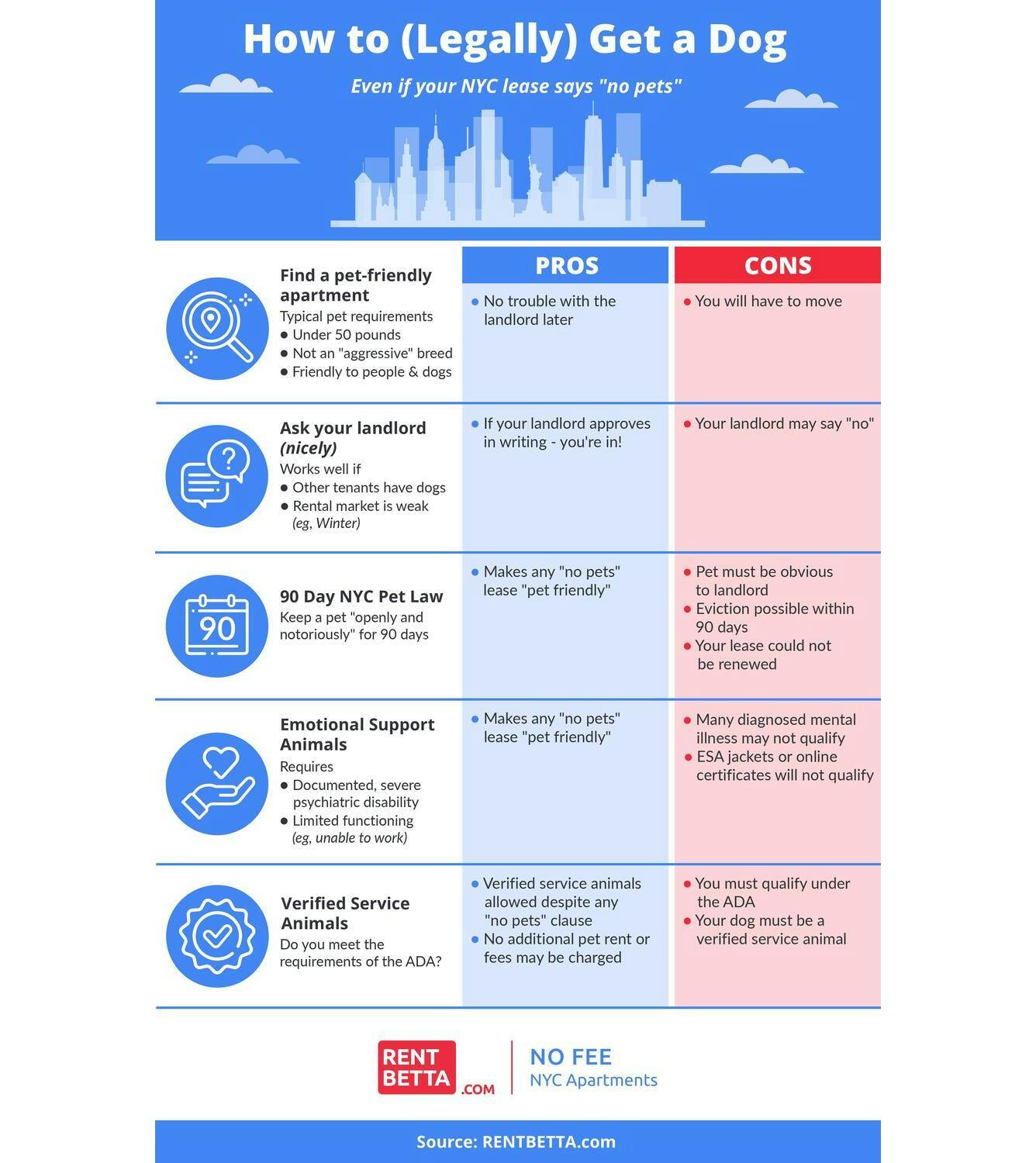The 90 Day NYC Pet Law
August 29, 2023 | 8 minute read | the RENT BETTA team

Would you like to own a dog in New York City, but your lease says "no pets"?
Ask your landlord (nicely) for permission, use the 90 day rule in the NYC Pet Law, or legally meet the requirements for an Emotional Support or Service Animal to get around a “no pets” lease provision. If your neighbors have a cat or dog, your landlord may be flexible and open to a polite request. If you live in a walk-up without a landlord or Super on site, you may also have some leeway. But don't expect to get very far in a "no pets" luxury building where a concierge guards the door.

Even if your lease says "no pets", you may still be able to get a dog in your NYC apartment. Source: RENTBETTA.com
1. Find a Pet-Friendly Apartment on RENTBETTA.com
The easiest way to have a pet is to live in a pet-friendly building and follow their pet policy, so you avoid any drama with the landlord.
So if your current landlord won’t come around, start looking at your options for no fee apartments, and make a plan to move out when your lease is up.
The best time to move is during winter, when rents are at their annual lowest and you'll have the most apartments from which to choose.
Try RENTBETTA.com, a new site that eliminates broker fees by connecting renters directly with the dozens of no fee leasing offices throughout NYC.
To find a pet-friendly apartment, click “Dogs” or “Cats” on the left search bar and open any listing to see a full description of that building's Pet Policy, based on the last time we spoke with management.
Buildings are typically more accommodating to pets during winter when it is harder to find tenants. We recommend you ask about their pet policy details during your tour, in case they have changed.
Pet-Friendly Requirements for Most NYC Buildings
50 pounds (sometimes 35) or less
No aggressive breeds (eg, Pitbulls, German Shepherds, Rottweilers, or any large dog that would scare children)
Friendly towards people and other dogs
Expect the leasing office to ask to meet your dog, either when you first go for a tour or when you submit your application.
If your dog comes up to the leasing office staff eager to sniff and with a wagging tail, you will pass the "friendly" test with flying colors!
If the dog growls or acts defensive, they will likely reject your application.
Check out our other tips for owning a dog in NYC to save money and stress.
2. Ask Your Landlord (Nicely)
This is our favorite approach if you are looking to stay in your current apartment.
Send your landlord a polite email, saying you are eager to get a dog (or cat), but you like the building and would prefer to stay in your current apartment if possible.
Mention how you’ve been a responsible tenant by paying the rent on time and keeping the place clean. These are the most important factors landlords look for in tenants.
Include that you’re looking for a well-behaved, small dog (less than 50 pounds), and maybe send a picture of what you found online if you’ve already picked a dog out.
Don’t mention anything about a puppy!
Puppies scare landlords because they don't come housetrained and go through a chewing phase. Adult dogs are much easier to take care of anyways.
The landlord might "bite" on your request, and if they give their approval in writing, your lease just became "pet friendly."
Tip: this approach is more likely to work during the winter if your lease is coming up for renewal than the summer, when it's easier to find another tenant. If you're looking for an apartment, see more NYC renting tips to save money.
3. The 90 Day NYC Pet Law
In New York City, if you keep a pet “openly and notoriously” for at least 90 days and your landlord doesn’t begin legal action to evict you, they legally lose the right to do so in the future.
So if you get a dog, don't keep it a secret and you'll start running down the clock. After 90 days, you've technically made your "no pets" apartment "pet friendly."
This is the New York City Pet Law.
So how do you qualify?
Keep the Pet “Openly and Notoriously”
This means you may not hide the pet from your landlord or their agents (eg, the Super or any repairmen), and the landlord must be aware or should be aware of the pet.
If you have a dog, “openly and notoriously” is easy to establish in court, as you're probably taking the animal out the front door a few times a day to go to the bathroom.
If you have a cat, someone coming by to make repairs in your apartment and seeing the cat or its belongings should suffice.
Put up a Pet Alert sticker ($6) on your front door and take a picture of it to get a timestamp. Keep a record of the dates and times any repairmen came to your apartment or saw you and your pet in the hallways.
90 Days Must Pass
Hold on to any adoption or breeder paperwork showing the data you first took ownership of the pet to establish a timeline.
Vet records showing when you brought the dog in for shots, or your log of dates and times from when your landlord or his agents saw your pet will also help establish the start of the 90 day period.
Once you meet the “openly and notoriously” requirement for 90 days or more, your landlord loses the legal grounds to evict you based on a “no pets” clause in the lease.
Just remember, it's not 90 days since when you first bought or adopted your pet, its 90 days from when your landlord or their agents noticed or should have noticed your pet because you are keeping it so openly.
They can still take you to court, but your defense will be the NYC Pet Law and the evidence you’ve diligently recorded.
Bear in mind, however, if you’re a market-rate tenant your landlord can decide to not offer you a lease renewal for any reason. The NYC Pet Law only protects you during your lease.
So if your dog becomes a point of contention, your landlord can force you to move out when your lease is up. The 90 Day Pet Law works best for rent-stabilized tenants who have guaranteed lease renewals.
If you're a market rate tenant, keep your dog from being a nuisance and your landlord may look the other way when it comes time to renew your lease.
4. Emotional Support Animals
This is harder to prove than you might think, and an online certificate or doggie jacket from Amazon emblazoned “Emotional Support Animal” will not qualify.
What you need to establish is that you have a mental disability, and without the pet your isolation and loneliness could increase to the point where you need psychiatric care.
It's a pretty high bar.
The severity of your psychiatric disability must be so high as to limit your day-to-day functioning, and having a diagnosed mental illness is not enough to meet the threshold for an ESA.
One test that courts will look to is if you are on disability, or if you have a job and are able to work.
If you are on Social Security Disability (SSD) or Supplemental Security Income (SSI), there is strong evidence you qualify for an ESA, as you have been found by the government unable to work, a major life activity.
If you are working, however, it will be hard to prove you are sufficiently disabled to qualify for an ESA.
A letter from a local doctor or therapist, ideally one who could testify in court as an expert witness, stating that you need this pet due to your psychiatric disability which is otherwise likely to worsen, should meet the legal requirements to win your case.
Just as with the NYC Pet Law, the ESA carve-out for pets mainly helps rent stabilized tenants, who are guaranteed lease renewals.
Market-rate tenants are not guaranteed renewals, so a landlord can always decide to not renew your lease if they don’t like your dog, no matter how much evidence you are building for your ESA case.
5. Verified Service Animals
As per the Americans with Disabilities Act, a verified service animal is allowed without question, regardless of any “no pets” clause, and no additional pet rent or fees may be charged.
You must have a legal disability for the pet to qualify as a service animal.
Nuisance Animals and the NYC Dog Barking Law
Even if your pet is allowed by the lease or through another method described here, your landlord can still require you to get rid of it if it qualifies as a “nuisance”.
A “nuisance” is repeated and ongoing behavior (not just a one-time event) that interferes with your neighbors’ ability to live in and enjoy their own apartments.
This could be repeated loud barking, aggressive behavior like snarling or trying to bite neighbors, or going to the bathroom in public areas.
Yes, there is even a NYC Dog Barking Law, which other tenants may call 311 to complain about excessive barking:
1. 10 minute straight between 7am and 10pm
2. 5 minutes straight between 10pm and 7am
We've never done this, but apparently the NYC Department of Environmental Protection sends a letter to the dog's owner within 7 days of a complaint.
Weird, but there are a lot of barking dogs in NYC. And even more people trying to sleep.
So keep Fido well-behaved, as even a “pet-friendly” building can require you to re-home a dog that becomes a continual nuisance to your neighbors.
Exotic Pets in New York City
NYC has a lot of people, and therefore are a lot of laws to make sure we all fit here comfortably. No matter how pet-friendly your apartment is, you can never own an exotic pet in NYC.
The only animals you are allowed to keep in a NYC apartment are domesticated cats and dogs, small birds, or small caged animals like a gerbil or hamster.
Randomly, honeybees and non-snapping turtles under 4 inches in length are also allowed.
What isn’t allowed in NYC?
Basically, everything else.
Wild animals, ferrets (and the entire Mustelidae family for that matter, which includes badgers and weasels), squirrels, spiders, insects, and venomous or constricting snakes are not allowed in NYC apartments. No exceptions.
Basically, if it’s not a domesticated cat, dog or small bird, you're likely not allowed to own it, under any circumstances.
If you're concerned for your safety, you may call 311 to report an exotic animal in your building.
Conclusion
The easiest way to own a dog in NYC is to live in a pet-friendly apartment and follow the building's pet policy. Even if your lease says “no pets”, try asking your landlord (nicely) for permission via email. If you live in a walk-up building, the NYC Pet Law will allow you to keep a dog once you have it “openly and notoriously” for at least 90 days. If you live in a doorman building, it's hard to skirt pet restrictions (we wouldn't even try), as the doorman will likely stop you the first time you walk in with a new dog. Try to keep good relations with your landlord, as they can decide not to renew your lease if they deem the dog a problem.